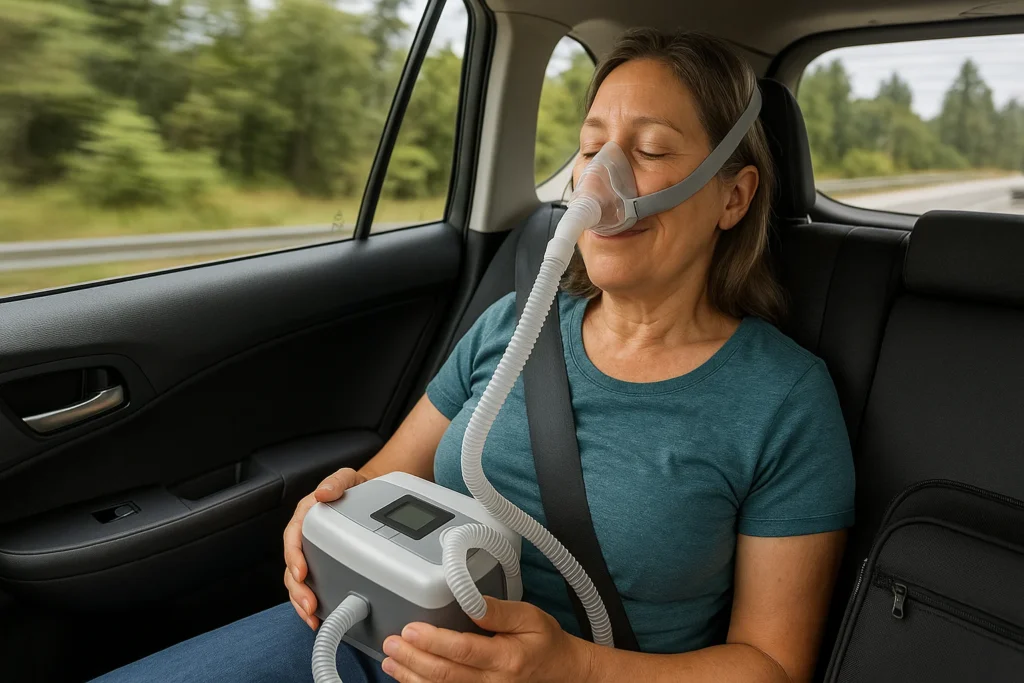Traveling is an enriching experience, offering the chance to explore new places and cultures. However, if you have sleep apnea, the thought of venturing far from home might bring up concerns about maintaining your therapy. With a little preparation and the right tools, you can enjoy your travels without compromising your health. This guide offers practical advice for flying, road trips, and staying on therapy while on vacation.
Before your next trip, explore our Home Sleep Apnea Testing service to ensure your therapy plan is effective and travel-ready.
Traveling by air with a CPAP machine requires awareness of specific TSA regulations. Fortunately, the Transportation Security Administration (TSA) classifies CPAP machines as medical devices, which means they don’t count as part of your carry-on baggage limit. Here’s what you need to know:
- Separate Your CPAP Machine: When going through security, inform the TSA officer that you have a CPAP machine. You will need to remove it from its case for X-ray screening, similar to a laptop. Place the machine in a bin.
- Bring a Clear Plastic Bag: Use it to place your CPAP machine during screening to keep it clean. TSA provides disposable plastic bags at many airports if you forget yours.
- Medically Necessary Liquids: If you use distilled water for your CPAP humidifier, you can carry more than the usual 3.4 ounces, but declare it at the checkpoint.
- Understand Your Rights: If you are concerned about the cleanliness of the security screening area, request a manual inspection of your CPAP machine.
Traveling with Sleep Apnea Machines
When preparing for your trip, it’s essential to pack your CPAP machine properly. Here are some tips:
Pack Smart
- Use a Dedicated Bag: Most CPAP machines come with a travel case. Use it to keep all components organized and protected.
- Include Extra Supplies: Pack extra filters, mask cushions, and any other essential supplies you might need. It’s better to have more than less, especially if you’re traveling to a remote area.
- Power Solutions: Research the power outlets at your destination. You might need an adapter or a converter for international trips.
- Portable CPAP Batteries: Consider investing in a portable CPAP battery if you plan to camp or stay in places without reliable power. Check airline policies regarding lithium batteries if you’re flying.
According to the Sleep Foundation’s Best Travel CPAP Machines guide, choosing the right portable CPAP device can make all the difference when you’re on the move.
Staying on Therapy During Flights
- In-Flight Use: Not all airlines allow the use of CPAP machines during flights. Check with your airline beforehand. If allowed, ensure you have the necessary power adapters and extensions.
- Seat Selection: Choose a seat near a power outlet if you plan to use your CPAP during the flight.
Hotel and Airline CPAP Advice
When booking accommodations, it’s crucial to consider your CPAP needs:
Hotel Stays
- Call Ahead: Before booking, call the hotel to inquire about the availability of power outlets near the bed. Some hotels offer distilled water for CPAP machines upon request.
- Room Setup: Once you arrive, inspect the room setup. You might need an extension cord to position your CPAP machine conveniently.
Airline Tips
- Inform the Airline: Notify the airline of your CPAP machine when booking your flight. Some airlines have specific policies for medical devices that you need to follow.
- Pre-Boarding: Request pre-boarding to give yourself time to set up your CPAP machine without feeling rushed.

Road Trips with Sleep Apnea
Road trips offer more flexibility than flying, but they also require planning:
- Power Inverters: If you’re traveling by car, a power inverter can convert your car’s DC power to AC power, allowing you to use your CPAP machine during rest stops.
- Frequent Breaks: Plan for frequent breaks to set up and use your CPAP if necessary. This is especially important for long drives.
- Local Resources: Research medical supply stores along your route in case you need emergency supplies or replacements.
Staying on Therapy During Vacation
Maintaining your sleep apnea therapy while on vacation is crucial for your health and enjoyment:
Consistent Use
- Routine: Try to stick to your regular sleep routine as much as possible. Consistent use of your CPAP machine ensures you get restful sleep, even on vacation.
- Set Reminders: Use phone alarms or reminders to help you remember to set up your CPAP machine each night.
Addressing Challenges
- Language Barriers: If you’re traveling internationally, learn key phrases related to your CPAP needs in the local language. This can help in case you need to purchase supplies or seek assistance.
- Local Support: Research support groups or online forums for sleep apnea in your destination country. They can be valuable resources for tips and advice.
Conclusion
Traveling with sleep apnea requires some extra planning, but it is entirely manageable with the right strategies. By understanding TSA rules, preparing your CPAP machine for travel, and knowing your options for power and accommodation, you can enjoy your trip while maintaining your health. Remember, staying on therapy during vacation not only ensures you feel your best but also helps you make the most of your travel experiences. Safe travels!

